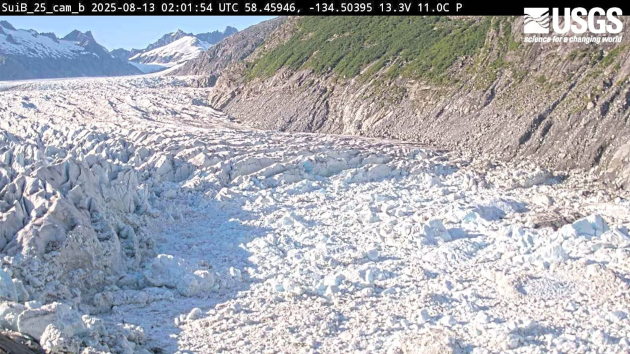
(JUNEAU, Alaska) -- One of Alaska's most populated cities is bracing for potentially catastrophic flooding as a basin dammed within the Mendenhall Glacier has started to release rainwater and snowmelt downstream, according to officials.
Suicide Basin, a side basin within the Mendenhall Glacier that sits above the city of Juneau, regularly releases glacier lake outburst floods, according to the National Weather Service. But recent measurements of water within the basement suggest the basin could release enough water to overwhelm the Mendenhall River and Mendenhall Lake, according to officials.
By 7 a.m. local time, the Mendenhall River had reached a major flood stage at 16.51 feet and was continuing to rise -- surpassing the record flood stage set in 2024 of 15.99 feet, according to the NWS. Flood warnings have been issued for the lake and river due to the release.
Residents along the flood zones have been urged to evacuate the area, with the peak flooding expected Wednesday around 8 a.m. local time.
"Don't Wait. Evacuate TONIGHT," the City of Juneau wrote in a Facebook post Tuesday night.
City officials were warning residents early Wednesday to avoid driving on roads within the flood zone already inundated by water.
Alaska Sen. Lisa Murkowski posted to X on Wednesday, warning of how dire the situation could become.
"This is likely to become a life-threatening situation," Murkowski said. "If you are told to evacuate, stop what you are doing and immediately go to an emergency shelter or another safe location."
Floodwaters are expected to fall below the flood stage through Thursday, according to the NWS.
Mendenhall is a popular tourist attraction in Alaska, but the retreating glacier -- which acts as a dam for Suicide Basin -- has caused flooding in the region every summer in recent years after it refills with water from rain and melting snow in the spring.
In 2023, a glacier lake outburst at Mendenhall's Suicide Basin destroyed several structures along the Mendenhall River as the water rushed downstream. The record flooding prompted city officials in Juneau to issue an emergency declaration.
The outburst, which caused a decade's worth of erosion in one weekend, would not have happened without climate change, NOAA said in 2023. Alaska has warmed twice as fast as any U.S. state over the last several decades, according to NOAA's National Centers for Environmental Information. Suicide Basin has been releasing glacier lake outburst floods since 2011, so the National Weather Service in Juneau's monitoring program has a camera pointed directly at the basin to see how much water levels are rising and falling.
Glaciers in Alaska have been experiencing a steep decline since the late 1980s, according to the state's Department of Geological and Geophysical Surveys.
Globally, glaciers are at risk of significant ice loss due to climate change, scientists say.
Glaciers around the world lost an estimated 7,211 billion tons of ice between 2000 and 2023, equating to an average annual loss of 301 billion tons, according to a Nature study published in February. The rate of ice loss has increased by about 36% in the past two decades, the researchers found.
Even if warming were to stabilize at current levels, the world's glaciers would still likely lose at least 39% of mass, according to the World Economic Forum.
Copyright © 2025, ABC Audio. All rights reserved.

